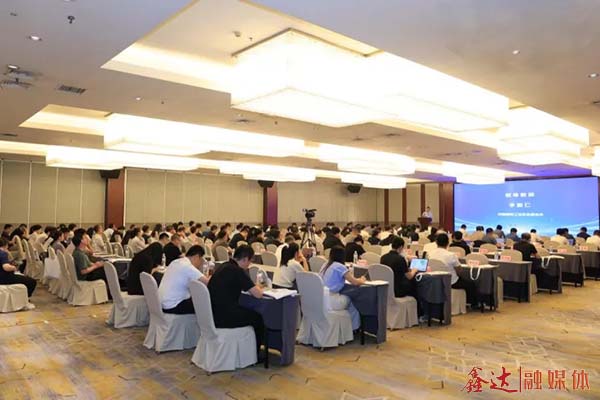
On August 14th, the Fifth Digital Education and Training Seminar for the Steel Industry and the Hebei Province Steel Industry Education and Training Matching Conference, with the theme of "AI Empowering Talent Cultivation in Steel Enterprises", was held in Shijiazhuang, Hebei Province, focusing on the application and prospects of digitalization and AI (Artificial Intelligence) technologies in education and training.
At the meeting, Li Yiren, vice president of the China Iron and Steel Association, and Song Xiangdang, a deputy provincial-level leading cadre of the Department of Industry and Information Technology of Hebei Province, delivered speeches. Feng Chao, deputy secretary-general of the China Iron and Steel Association and director of the Science, Technology and Environmental Protection Department, delivered a keynote speech titled "Digital Transformation of the Steel Industry", and Yang Wenhao, a specially invited human resources expert, gave a special report titled "Planning and Layout to Empower and Enhance Efficiency: Human Resources Planning and Layout under the Background of the 15th Five-Year Plan". Zhang Xiaohui, Director of the Steel Industry Division of the Department of Industry and Information Technology of Hebei Province, Li Tingru, Deputy Director of the Standards Consultation Department of the Talent Exchange Center of the Ministry of Industry and Information Technology, Cao Li, Deputy Director of the Talent Evaluation Division of the Education and Examination Center of the Ministry of Industry and Information Technology, and others attended. Wang Hebin, director of the Metallurgical Industry Education Resources Development Center, and Fan Liwei, deputy director of the Human Resources Department of Henan Iron and Steel, respectively presided over the morning and afternoon meetings.
Li Yiren stated that currently, artificial intelligence technology is transforming all industries at an unprecedented speed. The steel industry must keep pace with The Times, actively embrace AI technology, and especially achieve breakthroughs in the key link of talent cultivation. He believes that AI empowering talent cultivation is not only an innovation in technical means, but also a revolution in educational concepts.
Subsequently, he put forward five suggestions regarding digital education and training in the steel industry. First, we should strengthen the consensus on AI and clearly recognize the exponential changes and disruptive revolutions brought about by the rapid development and iteration of AI. Second, enhance exchanges and cooperation to jointly explore digital education and training models and methods suitable for the steel industry. Third, focus on actual needs, take solving the practical problems encountered by enterprises in the process of digital transformation as the orientation, and pay attention to the adaptability and pertinence of the training content. Fourth, promote integrated innovation to enhance the efficiency and quality of training. Fifth, we should strengthen the construction of the teaching staff and at the same time encourage technical backbone and management personnel of enterprises to participate in digital education and training platforms.
Song Xiangdang believes that the transformation and upgrading path of the steel industry is also a path of iterative upgrading of talent skills. He introduced that under the digital wave, steel enterprises in Hebei Province are seeking their own business tracks. The provincial committee and government of Hebei Province have also put forward specific requirements for strengthening the cultivation of talents in the steel industry. The Department of Industry and Information Technology of Hebei Province has carried out a series of continuing education programs relying on key universities such as University of Science and Technology Beijing, North China University of Science and Technology, and Hebei Vocational and Technical University of Industry, and explored a targeted enrollment model. Finally, he hopes that today's meeting will serve as a new starting point to accelerate the iterative upgrading of technological development in Hebei Province, continuously cultivate various types of skilled talents, and jointly create a high-quality development future for the steel industry.
When giving a report, Feng Chao expressed his earnest expectations for steel enterprises to closely follow the wave of digital transformation. He also introduced that the maturity assessment standard for digital transformation in the steel industry will help steel enterprises solve three problems in digital transformation: "understanding the current situation", "clarifying the future" and "forming a synergy". It provides important guidance for the directions and key tasks that steel enterprises need to focus on in intelligent manufacturing during the "15th Five-Year Plan" period.
Yang Wenhao gave a special lecture on four aspects: the transformation of human resources reform policies from quantitative change to qualitative change, talent review and diagnosis, performance management and job value analysis, and human resources development planning and implementation.
Subsequently, 11 experts from both within and outside the industry gave lectures on hot topics such as digital learning, talent cultivation and motivation, the promotion of industry-education integration, and the training of cybersecurity talents in digital transformation.
CAI Linpeng, Director of the Information Department of the Metallurgical Education Center, delivered a keynote speech titled "Leading the Cultivation of Digital Talents in the Steel Industry - The Mission and Practice of the Metallurgical Industry Education Resources Development Center"
Xu Guanglu, the general manager of the Digital Green and Low-Carbon Division of Hebei Iron & Steel Group, delivered a keynote speech titled "Digital Energy and Carbon Management Platform Empowering Innovation and Practice in Steel Enterprises"
Xu Guoliang, the vice president of Shandong Iron and Steel Craftsmen College, delivered a keynote speech titled "Four-Stage Training and Combat to Inspire Innovation in Skilled Talents"
Xiao Pengcheng, the vice dean of the School of Steel and Carbon Neutrality at North China University of Science and Technology, delivered a keynote speech titled "The Yan-Zhao Steel Laboratory Empowering the Practice of Talent Cultivation in the Steel Industry"
Zong Yanbing, the dean of the School of Advanced Engineering at University of Science and Technology Beijing, delivered a keynote speech titled "Reform Practice of Cultivating Outstanding Engineering Talents at University of Science and Technology Beijing"
Cao Lei, the vice dean of the School of Materials Engineering at Hebei Vocational and Technical University of Industry, delivered a keynote speech titled "Exploration and Practice of the Construction of the Professional Group of Intelligent Metallurgical Technology for Steel"
Zhao Junjun, the president of Zhixueyun, delivered a keynote speech titled "The New Era of AI Learning"
Cheng Junhai, the chairman of Hebei Chuangjian, delivered a keynote speech titled "Two-way Driving of Industry-Education Integration for the Cultivation of New Quality Productivity Talents"
Cui Kun, the deputy general manager of Wanfang Software, delivered a keynote speech titled "Activating Data Elements to Accelerate the Application Practice of the Four-Chain Integration Industrial Technology Innovation Service Platform"
Xu Lu, the head of the Government and enterprise business of the Training and Certification Department of Sangfor Technology, delivered a keynote speech titled "Safety First in Steel Manufacturing: A New Paradigm for Cybersecurity Talent Cultivation in Digital Transformation"
Cheng Liang, the product director of Deep Growth, delivered a keynote speech titled "The Hard Nuclear Weapon to Boost Sales Performance by a HundredFold - AI Sales Training Officer"
After the meeting, the representatives also visited Hebei Iron & Steel Digital Technology Co., Ltd. and the practical teaching base of Hebei Vocational and Technical University of Industry on the spot.
It is learned that this symposium was guided by the China Iron and Steel Association and the Department of Industry and Information Technology of Hebei Province, and was hosted by the Metallurgical Industry Education Resources Development Center and the Vocational Training Center of the China Iron and Steel Association. More than 150 representatives from the industry and information technology system, relevant associations, universities, steel enterprises and digital education and training service institutions attended the event.

 Email
Email Email
Email
